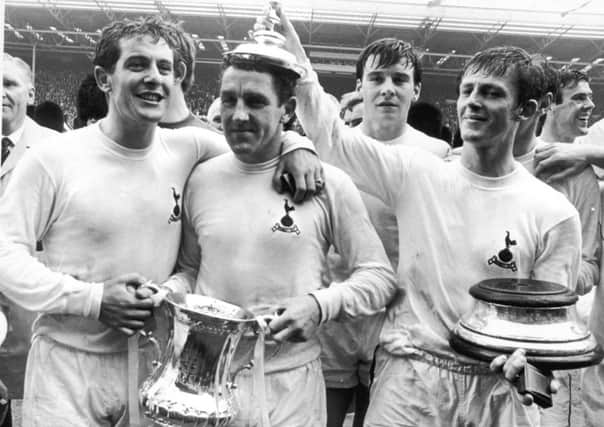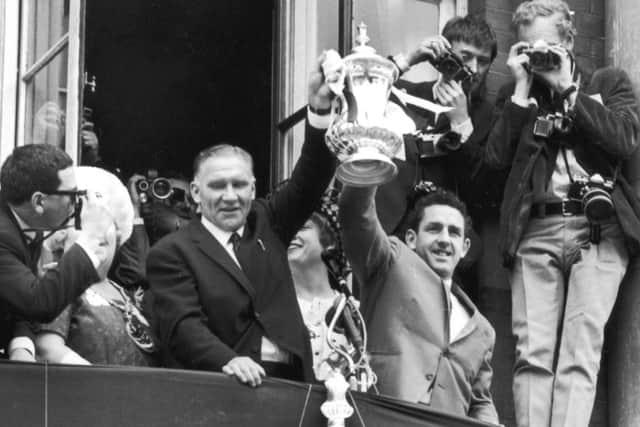Dave Mackay had art and graft to succeed


Growing up in Balgreen, barely a mile to the west of Tynecastle, he dreamed from infancy of playing for his local club, Heart of Midlothian, and for Scotland. The words in which he expressed that dream are still inscribed on the wall in the home dressing room in the ground that became his home.
“For as long as I can remember, all I wanted in my life, nothing else, was to play for Hearts, which is my dream team,” he said. “And to play for Scotland. I had no ambition for anything else. Always Hearts.”
Advertisement
Hide AdAdvertisement
Hide AdBy the time he was born in late 1934, Hearts had gone almost three decades without winning a major trophy. That drought continued into the immediate post-war years. It would end within a year of his making his Hearts debut.


Arguably the most significant game of Mackay’s days as a young player came in the final of the Scottish Schools Cup, at Tynecastle in which his team, Saughton High, beat the Glasgow side Kings Park. Mackay learned years later that two of the figures in the crowd had been Hearts player Willie Bauld and club trainer John Harvey.
According to the story that eventually reached Mackay, Bauld, who was already established in the Hearts team, told Harvey that signing Mackay had to be a priority. “We’ll no start winning anything until that wee laddie is playing for Hearts,” Bauld said.
FOLLOW US
SCOTSMAN TABLET AND MOBILE APPS
Two years later, Mackay agreed to join Hearts, then managed by another of the men revered as one of the club’s greatest ever players, Tommy Walker. He played out the season for Newtongrange Star first, and turned out in a junior international against Ireland – an appearance that led to one of the first, and most perceptive, assessments of him in the press. “What a find Hearts have in left-half Davie Mackay,” journalist Laurie Cumming wrote. “Top architect in Scotland’s success, his grand positional play and strong tackling had the crowd voting him the best youngster they had ever seen in a junior national side.”
Mackay may have been the architect of a team of schoolboys, but at Tynecastle it was Walker who was in charge of a grand construction project. With Bauld and the other two members of the Terrible Trio, Jimmy Wardhaugh and Alfie Conn, already in place, the manager knew he had firepower to spare.
Walker would have artistry out wide as well once Alex Young broke into the side, the defence was solid enough too, and in the versatile John Cumming he had a player who was at home at wing-half or left-back, among other positions. But he still needed one more element to ensure that this embryonic team of considerable ability would grow into more than the sum of its parts. That element was Dave Mackay.
Although the received wisdom about Mackay is that he was a tough tackler first and foremost, his contribution to the team was far more varied and valuable. While he used his robust strength to break up opposition attacks, he was just as adept at the more creative side of the game, helping ensure that the likes of Conn, Bauld and Wardhaugh got an adequate supply of the ball.
After making his debut in November 1953, he returned to the reserves for several months before taking a more lasting place in a team that finished second to Celtic that season. In the years that followed, Hearts swapped that runners-up tag for major honours. The League Cup in 1954 was followed by the Scottish Cup two years later. Then came the crowning glory: the 1957-58 season in which, with Mackay now the captain, Hearts became league champions, scoring a record 132 goals in the process.
Advertisement
Hide AdAdvertisement
Hide AdAnother title would follow two seasons later, and three further League Cups would find their way into the trophy cabinet. This was the most successful team in Hearts’ history, and Mackay was at the core of it.
Although he had dreamed of nothing else in football than what he had achieved by his mid-20s, Mackay was inevitably lured to England. At Tottenham Hotspur, he swiftly proved that it was not just in Scotland that he could win trophies; and not just with Hearts that he could play a pivotal role in a successful side. Spurs won the double in 1961-62, added two more FA Cups in the following years – and threw in a Cup Winners’ Cup triumph for good measure.
Moving to Derby County at the end of the Sixties, he proved his versatility by playing as a sweeper. Managed by Brian Clough, Derby won promotion to the First Division, and would go on to win the title itself the year after Mackay left.
Any feeling that he had missed out on success in the Midlands was rectified in 1975 when, as manager, Mackay took Derby to another championship. They were one of 11 teams he took charge of in a managerial career that lasted a quarter of a century. That longevity is one indication of his success behind the scenes, but it is for his contribution on the field that Mackay will be best remembered.
Some players can fight to the death but lack the skill to prevail. Others have the ability but lack the strength of character. A born leader, Dave Mackay had both the heart and the art.